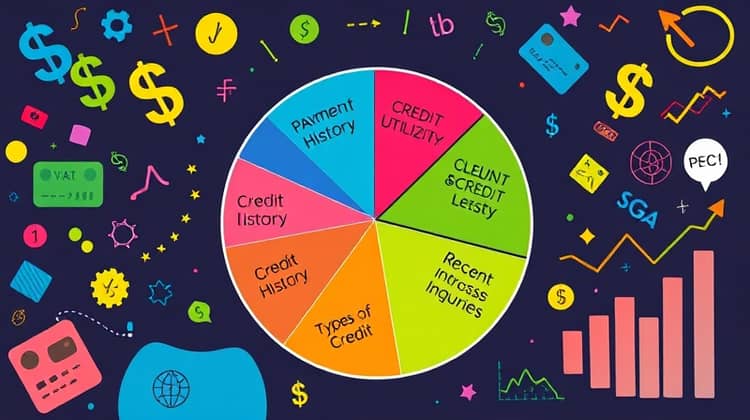Credit Scores Uncovered: How They Influence Your Loan Approval

Understanding your credit score is crucial for your personal finances, as it can significantly impact your ability to secure a loan and the interest rates you are offered. In this blog post, we will explore what a credit score is, how it's calculated, and its role in loan approvals. Furthermore, we'll discuss the different requirements from lenders, the types of loans available, and tips for improving and maintaining a good credit score.
As you navigate through the complexities of loans and credit, having a solid grasp of these concepts can empower you to make informed financial decisions. Whether you are planning to buy a home, purchase a car, or take out a personal loan, your credit score will play a significant role in determining your options and costs.
Join us as we uncover the essential facets of credit scoring and its influence on your financial future.
What is a Credit Score?

A credit score is a numerical representation of your creditworthiness, which reflects how likely you are to repay borrowed money. Typically ranging from 300 to 850, a higher score indicates better credit health. Lenders use these scores to assess an individual’s risk level before granting loans or credit.
Various factors contribute to the calculation of a credit score, including payment history, credit utilization, length of credit history, types of credit in use, and recent inquiries. Understanding these components can help consumers manage their scores effectively.
Ultimately, your credit score serves as a crucial tool in helping lenders determine whether to approve you for credit or loans and at what terms. It is important to monitor your score regularly to ensure you remain in a healthy range.
How Credit Scores are Calculated

Credit scoring models, such as FICO and VantageScore, use different algorithms to evaluate the five main components of a credit report. The most significant factor is typically payment history, which makes up 35% of your score, reflecting whether you have paid your bills on time.
Following payment history, credit utilization accounts for about 30%, measuring the amount of credit you’re using compared to your total credit limit. Keeping this ratio low is vital for maintaining a good score, as high utilization can indicate over-reliance on credit.
Other factors include the length of your credit history (15%), types of credit in use (10%), and recent inquiries (10%). Each of these elements plays a role in forming the overall picture of your credit behavior. Knowing how these scores are calculated empowers you to take proactive steps in improving your credit standing.
The Importance of Credit Scores in Loan Approval

Credit scores are a primary criterion used by lenders when evaluating loan applications. A good credit score can be the difference between getting approved or denied for a loan and can also affect the interest rate you will receive. Lower scores might lead to higher interest rates, resulting in significant additional costs over the life of a loan.
Lenders view credit scores as an indication of risk; the higher your score, the lower the perceived risk, which allows lenders to offer more favorable terms. This is why having a strong credit score is essential, particularly for larger loans like mortgages, where even a slight variation in interest rates can lead to thousands of dollars in savings.
- A good credit score can help secure lower interest rates.
- A higher score increases the likelihood of loan approval.
- A strong credit history can simplify the loan application process.
Thus, understanding and managing your credit score are vital steps toward achieving your financial goals.
Different Lenders, Different Requirements

While credit scores are an essential consideration for most lenders, each financial institution may have different criteria for loan approval based on their risk tolerance and product offerings. Some lenders cater specifically to low-credit individuals, while others only accept applicants with excellent credit.
For example, banks may require higher credit scores for personal loans than credit unions, which often have more lenient standards. Additionally, certain lenders might focus on specific types of loans (like auto or mortgage loans) and their associated risks. Understanding these nuances can help you select the right lender for your specific circumstances.
It’s also important to note that lenders often look at more than just your credit score; factors such as income, employment history, and existing debts also play a critical role in the decision-making process.
Types of Loans and Credit Score Requirements

Different types of loans come with varying credit score requirements. For instance, a conventional mortgage typically requires a higher credit score—often in the range of 620 or above—compared to an FHA loan, which may accept scores as low as 580.
On the other hand, personal loans and auto loans may have more flexible requirements, allowing borrowers with lower scores to obtain financing. However, this often comes with higher interest rates to compensate for the increased risk to lenders.
- Conventional mortgages often require scores of 620 or higher.
- FHA loans may accept scores of 580 or above.
- Auto loans generally have more lenient requirements, though rates vary by score.
Knowing the specific score requirements for the type of loan you are seeking can help you better prepare your application.
How to Improve Your Credit Score

Improving your credit score is an accessible goal with the right strategies and commitment. Start by regularly reviewing your credit report to identify any errors and dispute them promptly. Cleaning up your report can give your score an immediate boost.
Additionally, focus on paying bills on time, ideally setting up automatic payments to avoid any late fees. Also, work on reducing your credit utilization by paying down existing debts and keeping credit card balances low.
- Pay bills on time to maintain a positive payment history.
- Reduce credit card balances to lower utilization rates.
- Avoid applying for multiple credit lines at once.
By implementing these strategies, you can gradually improve your credit score, leading to better loan prospects.
Tips for Building and Maintaining a Good Credit Score

To build a solid credit history, consider becoming an authorized user on a responsible individual’s credit card. This can allow you to benefit from their positive payment history without the risks of managing a credit account independently.
Furthermore, stay disciplined with your credit use. Only apply for new credit when necessary, as lengthy inquiries can negatively impact your score. Maintaining a mix of credit types, such as revolving credit cards and installment loans, can also favorably influence your score.
Conclusion

In conclusion, understanding credit scores and their implications is essential for anyone looking to secure financing. By being proactive and informed about your credit score, you can significantly influence the terms and approval of loans you apply for.
Moreover, taking steps to improve and maintain a healthy credit score not only enables you to access better loans and interest rates but also helps shape your overall financial wellbeing, paving the way for future opportunities.






